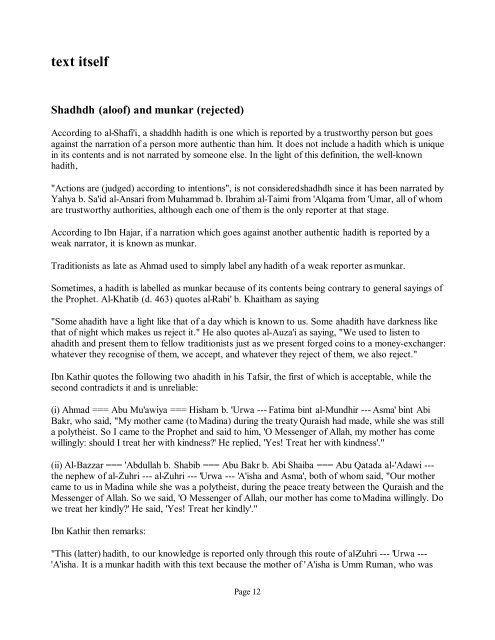Rules Governing The Criticism Of Hadith - Islam House
Rules Governing The Criticism Of Hadith - Islam House
Rules Governing The Criticism Of Hadith - Islam House
You also want an ePaper? Increase the reach of your titles
YUMPU automatically turns print PDFs into web optimized ePapers that Google loves.
text itself<br />
Shadhdh (aloof) and munkar (rejected)<br />
According to al-Shafi'i, a shaddhh hadith is one which is reported by a trustworthy person but goes<br />
against the narration of a person more authentic than him. It does not include a hadith which is unique<br />
in its contents and is not narrated by someone else. In the light of this definition, the well-known<br />
hadith,<br />
"Actions are (judged) according to intentions", is not considered shadhdh since it has been narrated by<br />
Yahya b. Sa'id al-Ansari from Muhammad b. Ibrahim al-Taimi from 'Alqama from 'Umar, all of whom<br />
are trustworthy authorities, although each one of them is the only reporter at that stage.<br />
According to Ibn Hajar, if a narration which goes against another authentic hadith is reported by a<br />
weak narrator, it is known as munkar.<br />
Traditionists as late as Ahmad used to simply label any hadith of a weak reporter as munkar.<br />
Sometimes, a hadith is labelled as munkar because of its contents being contrary to general sayings of<br />
the Prophet. Al-Khatib (d. 463) quotes al-Rabi' b. Khaitham as saying<br />
"Some ahadith have a light like that of a day which is known to us. Some ahadith have darkness like<br />
that of night which makes us reject it." He also quotes al-Auza'i as saying, "We used to listen to<br />
ahadith and present them to fellow traditionists just as we present forged coins to a money-exchanger:<br />
whatever they recognise of them, we accept, and whatever they reject of them, we also reject."<br />
Ibn Kathir quotes the following two ahadith in his Tafsir, the first of which is acceptable, while the<br />
second contradicts it and is unreliable:<br />
(i) Ahmad === Abu Mu'awiya === Hisham b. 'Urwa --- Fatima bint al-Mundhir --- Asma' bint Abi<br />
Bakr, who said, "My mother came (to Madina) during the treaty Quraish had made, while she was still<br />
a polytheist. So I came to the Prophet and said to him, 'O Messenger of Allah, my mother has come<br />
willingly: should I treat her with kindness?' He replied, 'Yes! Treat her with kindness'."<br />
(ii) Al-Bazzar === 'Abdullah b. Shabib === Abu Bakr b. Abi Shaiba === Abu Qatada al-'Adawi ---<br />
the nephew of al-Zuhri --- al-Zuhri --- 'Urwa --- 'A'isha and Asma', both of whom said, "Our mother<br />
came to us in Madina while she was a polytheist, during the peace treaty between the Quraish and the<br />
Messenger of Allah. So we said, 'O Messenger of Allah, our mother has come to Madina willingly. Do<br />
we treat her kindly?' He said, 'Yes! Treat her kindly'."<br />
Ibn Kathir then remarks:<br />
"This (latter) hadith, to our knowledge is reported only through this route of al-Zuhri --- 'Urwa ---<br />
'A'isha. It is a munkar hadith with this text because the mother of 'A'isha is Umm Ruman, who was<br />
Page 12

















